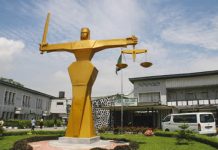A digital rights expert, Tope Ogundipe, has flayed the abuse of Nigeria’s Cybercrimes Act, to harass journalists and ordinary citizens. She spoke in Kampala, Uganda, at a workshop on Research Methods for Internet Policy and Advocacy.
The programme was organised by the Internet Policy Observatory at the Annenberg School for Communications, University of Pennsylvania.Ogundipe, who serves as the Director of Programmes at the pan-African social enterprise, Paradigm Initiative, spoke on “Cybercrime, Digital Rights and Law Enforcement in Nigeria.”
A statement by the organisers said, cybercrimes law has become a prime tool in the hands of the rich and powerful people to harass and arrest journalists, bloggers and other citizens who make comments online.
According to her, there had not been one incident where the Act was used to prosecute real cybercrime, since its passage in 2015.She lamented that on the contrary, it had been used to arrest ordinary citizens for comments made online, which some powerful Nigerians deem to be offensive.She disclosed that a large number of journalists have been arrested in Nigeria, using sections 24 and 38 of the law.
Ogundipe expressed concern that journalists in particular have been at the receiving end of cybercrimes-related arrests.She explained: “Paradigm Initiative, in partnership with Media Rights Agenda, and Enough is Enough Nigeria, had challenged the constitutionality of sections 24 and 38 of the cybercrimes law in the courts.
“The case has been in the courts since 2016. We lost at the court of first instance, but we are now at the Court of Appeal.”Ogundipe added that strategic litigation could be a long drawn out process, which requires patience and perseverance.
Over 35 researchers and practitioners from across Africa were gathered at Kabira Resort in Kampala, Uganda for an intense week of study on research methods that underpin internet policy and advocacy on the continent.
Participants at the workshop were drawn from 16 African countries, while the faculties came from within Africa, Europe and the United States.Questions on how best to conduct strategic litigation within their countries featured at the workshop.













